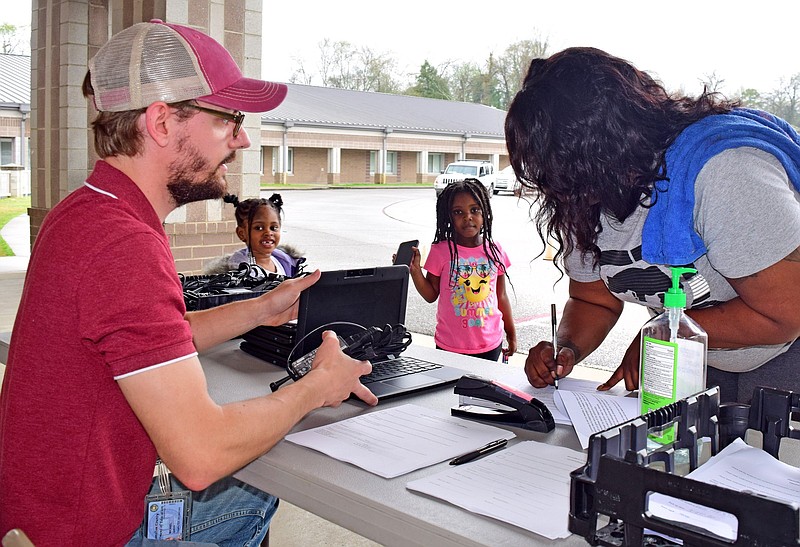Over the years there's been a lot of talk about leveling the playing field for disadvantaged students in Hamilton County whose families don't have enough money to pay for an internet service that can help their youngsters learn and do their homework with school-provided tablets.
That talk grew late last winter and throughout the spring as COVID-19 closed our schools and classes suddenly were available only online. Imagine your concern for your child's learning in that circumstance if you couldn't afford to pay for internet.
Some of us might say, well, I can cut back on this or that and come up with money for an internet link. But in so many of those already struggling homes, the virus also meant lost work, so often cutting back was needed for other important needs - like rent and groceries.
Finally - now with cases of the novel coronavirus rising daily in the county and across the state, as well as the fact that under our local school reopening guidelines, schools, if they reopened today, would likely have reduced on-campus hours or "blended" on-campus/remote learning - the talk at long last is turning to reality.
"In 2020, if it wasn't obvious before, it's more apparent than ever: High-speed broadband is a baseline need for American families," Chattanooga Mayor Andy Berke told the Times Free Press on Tuesday as he and County Mayor Jim Coppinger, schools Superintendent Bryan Johnson, BlueCross BlueShield's Roy Vaughn as well as EPB leaders David Wade and board chairman Warren Logan announced an $8.2 million, 10-year funding commitment to make it happen.
The initiative, called HCS EdConnect, will bring free high-speed internet to about 28,500 students in some 17,000 households who receive free or reduced-price lunches.
Berke says the program will make Chattanooga the first city in the country to "bridge the digital divide" in education by providing free internet to all students in need.
It is not a money-maker for EPB, which is owned by the city. Remember, we said "free."
Of the $8.2 million commitment to hook up each qualifying home and provide free service for 10 years - basically the time a child is in elementary, middle and high school - $6 million already has been raised, including $1.5 million each from Hamilton County and the city of Chattanooga. The Hamilton County school system, EPB, the BlueCross Blue Shield of Tennessee Foundation and the Smart City Venture Fund also are committing funds. The Smart City Venture Fund includes Benwood Foundation, Community Foundation, Footprint Foundation and the Robert L. And Katherina Maclellan Foundation. The Enterprise Center will facilitate communications and deliver technical support for HCS EdConnect.
The families of qualifying students will receive a router installed in their home that would provide at least 100 Mbps of internet service with no data caps. There will be no filters on content on the internet connection itself, although the district has filters on the tablets it provides to students.
The school district is joining with EPB and other community organizations to roll out the service. Officials estimated only 20 percent of those families have previously had EPB internet service.
According to EPB, this internet service is at least four times faster than typical educational access offerings - i.e., low cost service - from other providers, and it is the only one that delivers symmetrical speeds (same speed for uploads and downloads) with no data caps. That means HCS EdConnect families will have more than enough broadband capacity and data to participate in video-based learning and other high bandwidth educational applications.
In a statement, Coppinger said: "We're meeting the challenges of the COVID crisis head-on by creating this innovative new program to ensure that our students have the connectivity they need to excel in the short-term and for the foreseeable future."
Vaughn, executive director of the BlueCross Foundation, reminds us that educational success is one of the most important indicators of community health.
"This program will help Hamilton County students keep learning in today's unique environment - and beyond - and help address the societal inequities that make it difficult for families to thrive," he said in a statement.
Johnson said the district is "thankful for the way this community is coming together to ensure the continuing educational progress of our children."
Online learning has been and will be an integral part of education in the 21st century. That's especially true now in a world growing increasingly remote because of COVID-19.
Now, just as our students are all able to ride buses to school when they are open, every student will also be able to fully participate in the very impressive online and virtual classrooms made available by Hamilton County schools since mid-March.
This effort to provide the necessary internet service also is impressive. Our community should be both grateful and proud.
